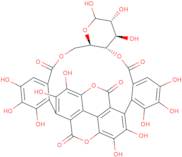
Información del producto
- 2,20,1,23-(Epoxy[2]propene[1,2]diyl[3]ylidene)-11H,15H-tribenzo[g,i,q][1,5,12]trioxacyclononadecin, <span class="text-smallcaps">D</span>-glucose deriv.
- 3,4,5,11,12,13,21,22,23,26,27,38,39-Tridecahydroxy-9,14,17,29,36-Pentaoxaoctacyclo[29.8.0.02,7
- <span class="text-smallcaps">D</span>-Glucose, cyclic 4,6-[(2S,2′S)-2,2′-(5,10-dihydro-2,3,7,8-tetrahydroxy-5,10-dioxo[1]benzopyrano[5,4,3-cde][1]benzopyran-1,6-diyl)bis[3,4,5-trihydroxybenzoate]]
- [1]Benzopyrano[5,4,3-cde][1]benzopyran, <span class="text-smallcaps">D</span>-glucose deriv.
Punicalin is a natural product that has been shown to be a potent anti-inflammatory agent. It has been shown to inhibit the production of cyclin D2, which is associated with the development of atherosclerotic lesions. Punicalin also induces autophagy and inhibits oxidative injury in mouse tumor cells. Punicalin has been shown to have antibacterial efficacy against gram-positive bacteria (e.g., Bacillus subtilis) and gram-negative bacteria (e.g., Escherichia coli). It can also be used for the treatment of infectious diseases such as tuberculosis or bacterial sepsis, which are characterized by high levels of oxidative stress. Punicalin has been shown to have a number of physiological effects, including an increase in liver glycogen content and blood sugar levels, as well as inhibiting gsh-px activities in rat liver cells.
Propiedades químicas
Consulta técnica sobre: 3D-FP74109 Punicalin
Si desea solicitar un presupuesto o realizar un pedido, por favor añada los productos deseados a su carrito y solicite un presupuesto o pedido desde el carrito. Es más rápido, más barato, y podrá beneficiarse de los descuentos y las ventajas disponibles.





